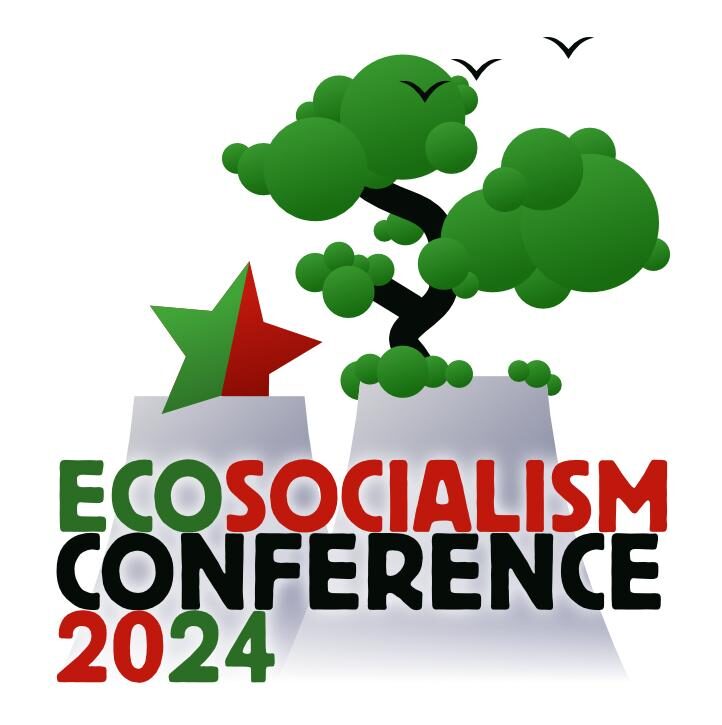Ecosocialism Conference 2023: organising for the future – report
We held our first Ecosocialism Conference on 2 December in central London and online. The conference was well attended, with 90 people in person and another 60 online.
Given what has happened this year there is a clearer than ever need to get ecosocialist ideas into the mainstream and organise ourselves around a strategy to overthrow capitalism. We have witnessed record temperatures and increasing instances of extreme weather: from Pakistan underwater, wildfires devastating Greece, Canada and Haiti, flash floods killing thousands in Libya, and the list goes on.
It now appears the increase of average temperature by 1.5°C (compared to pre-industrial capitalist society) is already locked in. The key fight remaining is to prevent an increase to 2°C – something that fossil capital is propelling us towards at speed.
And yet this year’s Conference of Parties (COP), the main global forum tasked with preventing runaway Global Warming, is dominated by oil industries in the host country of UAE. The President of COP28, Dr Sultan Al Jaber, is also head of Abu Dhabi National Oil Company (Adnoc) and attacked the idea that we need to phase out fossil fuels. Record numbers of fossil fuel lobbyists attended COP28 and it was revealed by the BBC that the UAE government intended to use the COP summit to sign new oil contracts. COP 28 has been a total and cynical disaster.
And it isn’t just this years COP – the whole process has failed. More Green House Gases have been released into the atmosphere since 1995 than in the entirety of previous human history. Conference organiser Simon Hannah has an article why this is happening despite the intentions of the UN and countless NGO campaigners. António Guterres, UN Secretary-General, has emerged as a leading voice warning about the consequences of global warming: “The dog days of summer are not just barking, they are biting. Climate breakdown has begun.” He warned we are no longer in a period of global warming but “global boiling.”
While a single Ecosocialist conference isn’t going to solve any of these fundamental issues, we wanted to start gathering the forces that can build a political force to make a difference. Despite some technical issues for online attendees (apologies for that!) we think the overall conference was a success and lots of useful feedback to improve for the future.
We wanted to keep the agenda simple so there were three plenary sessions, the first on how capitalism impacts the environment, the second a debate on degrowth and the final session about specific strategies around ecosocialist organising. Simon Pirani and Clara Paillard provided useful frameworks to think about capitalism and organising resistance; how the problem of the lack of wages at the end of the month and the overproduction leading to the climate arere rooted in the same problem, capitalists who won’t pay decent wages to ensure social reproduction are also destroying the basis of life on the Earth. Simon has already published their speech online. (We will post up videos and audio of the other speakers soon!)
The second session featured a debate over degrowth between Matt Huber and Elke Pirgmaier. On the surface a lot of the main contentions appeared terminological and rhetorical, about base building, locations of struggle, clarity, (how we frame the concept of reducing harmful economic activity in a way that doesn’t sound like austerity.) But this hides more substantive disagreements about electoral vs. movement based solutions, or variations of both; the role of the imperial core and how that shapes worker’s consciousness, the limits of projecting a future state, the centrality of changing production and the related issue of how, even if we can win over a mass force of workers and producers to change what aspects of economic activity should be reduced?
The session on strategy heard from Alia Amirali from Awami Workers Party Pakistan, Max Ajl who authored A People’s Green New Deal and Noah Herfort, co-founder of Climate Vanguard. Each gave a perspective on how we can mobilise wider forces and the framing of revolutionary politics in the climate crisis. It was good to hear a range of perspectives from the floor in the final session with important points to make about the fight around capitalism and environmental collapse in the global south. There was also a stress on how class is fundamentally concerned with human agency.
The organising committee that came together for the conference after ACR put out its public appeal in the summer and presented a draft statement to the conference. During the final sessions, organisers collected suggested amendments and changes from participants. The updated statement is available here.
The conference was not just a one off. We received some useful feedback from attendees as well, asking for more in depth strategic discussions, a focus on practical campaigns, more workshops for smaller and more horizontal discussions. We will likely have to get a more expensive venue next time to facilitiate workshops and better online capacity.
We will be building the networks and carrying on the conversation. We agreed to hold another conference, to organise an online reading group around ecosocialism to deepen our knowledge and to launch an ecosocialist journal combining theory, analysis and action. If you want to get involved, please get in touch info@ecosocialism-conference.org
